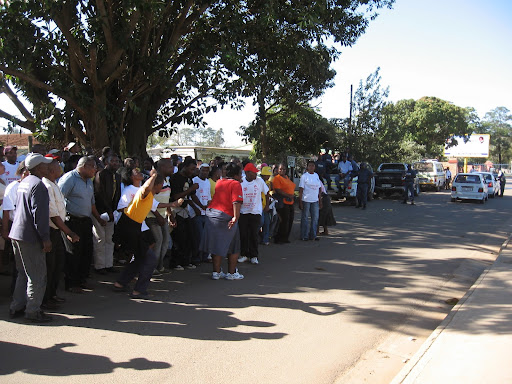She is dressed in her own, actually extremely stylish, clothes. All the nurses came to work in their civvies today. Many of them have been reporting intimidation from neighbours and even friends for continuing to work this week. Some have been getting threatening phone calls. Uniforms have been abandoned in an attempt to blend in.
“Where are you going?” I ask.
“To the strike.”
“Who will be helping in OPD?” She shrugs, smiles, and walks off. I walk around OPD. X-ray is shut, there are no nurses. Thankfully all is calm - only 3 or 4 unseen patients. Our normal number of 80 to 120 a day has dropped in the last few days to just 20 or 30. Those clinics that aren’t shut are operating on a skeleton staff and there have been very few referrals. Many of our outpatients are those with chronic problems that can wait. But many are not – there are a lot of people dying at home this week.
I cannot work so I wander to the front gate. The police are stood on the side of the road watching a crowd of around 100 staff members dancing and chanting. Whenever they begin to spill into the road a man in an ANC T-shirt gestures them back so that vehicles can still pass. The mood is good and they move to let cars and ambulances through the gate. Their chanting is considerably more melodic than their British counterparts.
Strikers dancing with the police looking on in the background
People begin trickling back into work at 3pm and we see those dedicated patients who remained throughout the afternoon.
“What is happening tomorrow?” I ask Mr Zulu, the OPD head. He shakes his head – he doesn’t really know either.
“But Wednesday – that will be a problem.”
A general strike has been called. Cooks, cleaners, telephone operators, patient note filing clerks, nurses, mortuary staff: no one will be going to work.
Apart from the managers.
Oh – and us.

Comments